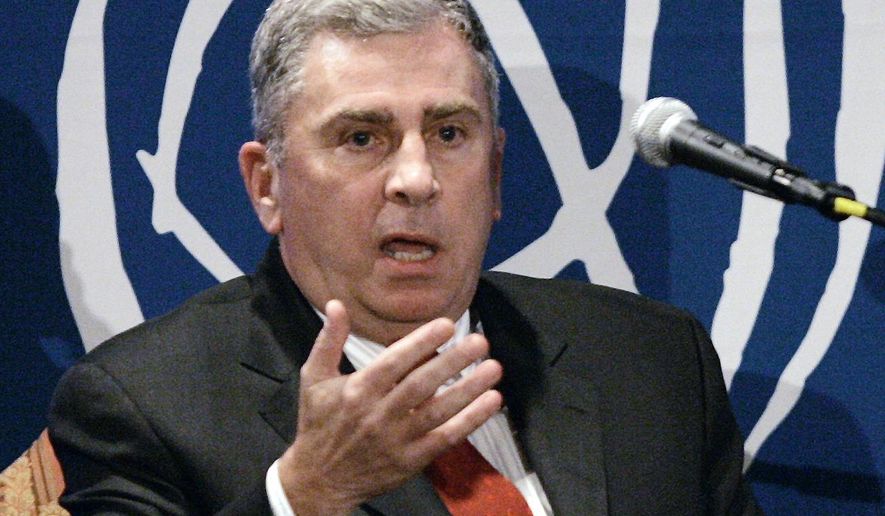President Trump’s pick to be the next ambassador to Saudi Arabia faced a barrage of questions over the oil-rich kingdom’s human rights record and the killing of dissident journalist Jamal Khashoggi at a sometimes contentious Senate confirmation hearing Wednesday.
Retired Army Gen. John Abizaid said he would press the kingdom on its rights record if confirmed, but stressed it was in the U.S. national interest to get along with Saudi Arabia and its polarizing de facto leader Crown Prime Mohammad bin Salman.
Although the envoy’s post in Riyadh has been vacant for more than two years, President Trump has put Saudi Arabia at the center of his larger Middle East policy, as an energy superpower, as a purchaser of U.S. arms, and as a bulwark against Iranian aggression in the region.
But there was clear anger among lawmakers over recent Saudi moves, from its conduct in the civil war in Yemen to the apparent government mission to silence the U.S.-based Khashoggi, who was killed in the Saudi consulate in Turkey in October.
Sen. Marco Rubio, Florida Republican, accused Crown Prince Muhammad of having gone “full gangster” in the murder of the journalist and in the regime’s attempts to cover up the crime.
“He is reckless, he’s ruthless, he has a penchant for escalation, for taking high risks, confrontational in his foreign policy approach, and I think increasingly willing to test the limits of what he can get away with the United States,” Mr. Rubio said during Wednesday’s hearing.
Gen. Abizaid acknowledged the Khashoggi affair remained one of several hot-button issues that must be worked through with Riyadh, along with such issues as human rights, the Yemen war, and a diplomatic feud with Qatar that has deeply divided America’s Persian Gulf Arab allies. Lawmakers are expected to vote soon again on a resolution calling for an end to all U.S. military and logistic support for the Saudi-led campaign in Yemen, which has helped fuel a massive humanitarian disaster.
Gen. Abizaid testified alongside Matthew Tueller, a career diplomat nominated to be the next U.S. ambassador to Iraq.
While promising to adopt a “forceful” dialogue with Riyadh over the Khashoggi affair, “in the long run, we need a strong and mature partnership with Saudi Arabia,” Gen. Abizaid said.
As Central Command chief from 2003 to 2007, the Arabic-speaking Gen. Abizaid worked closely with Saudi military commanders at the height of the Iraq War. Later as executive assistant to the Joint Chiefs of Staff, he oversaw the bilateral military relationship with Riyadh until his retirement in March 2007.
Still, the anger at recent Saudi behavior was palpable on both sides of the aisle on Capitol Hill.
“Saudi Arabia has engaged in acts that are simply not acceptable,” said Senate Foreign Relations Committee Chairman Sen. Jim Risch. The Idaho Republican has convened a pair of classified briefings looking into Mr. Khashoggi’s murder in the last month.
New Jersey Sen. Bob Menendez, the ranking Democrat on the panel, faulted the Trump administration for failing to hold Riyadh to account for Khashoggi’s death and for a briefing earlier this week that many lawmakers thought wanting.
“The administration’s attempt to explain its failure to provide a legally mandated determination about the murder of Khashoggi was insulting,” Sen. Menendez said.
While the Trump White House has imposed diplomatic sanctions on some members of the Saudi government linked to the Khashoggi operation, Mr. Trump has repeatedly refrained from targeting the crown prince himself, despite public claims by top U.S. intelligence leaders — including CIA Director Gina Haspel — implicating the Saudi leader in the crime.
“Maybe he did, maybe he didn’t,” Mr. Trump said in November when confronted with U.S. intelligence findings about the case, adding, “We may never know all the facts.”
• Carlo Muñoz can be reached at cmunoz@washingtontimes.com.
• Lauren Toms can be reached at lmeier@washingtontimes.com.




Please read our comment policy before commenting.